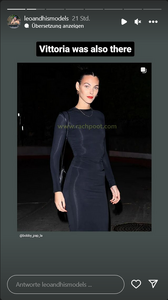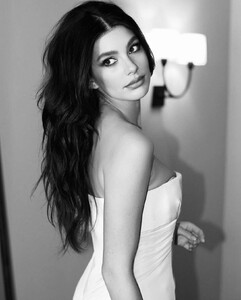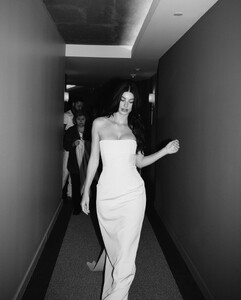
Everything posted by Jade Bahr
-
Leonardo DiCaprio - (Please Read First Post Prior to Posting)
I'm kinda into the scruffy look I have to admit (even though he could have smiled once). HOLLYWOOD, CALIFORNIA - JANUARY 09: Leonardo DiCaprio attends the Academy Of Motion Picture Arts & Sciences' 14th Annual Governors Awards at The Ray Dolby Ballroom on January 09, 2024 in Hollywood, California. (Photo by Emma McIntyre/WireImage)
-
Florence Pugh
- Florence Pugh
- Emily Blunt
😍 Emily Blunt at the 14th Governors Awards held at The Ray Dolby Ballroom at Ovation Hollywood on January 9, 2024 in Los Angeles, California. (Photo by Christopher Polk/WWD via Getty Images)- Leonardo DiCaprio - (Please Read First Post Prior to Posting)
Can't wait for the todays SAG noms. Fingers crossed Leo gets in. 2024 SAG Awards movie nominations predictions: ‘Killers of the Flower Moon,’ ‘Oppenheimer’ will lead- Leonardo DiCaprio - (Please Read First Post Prior to Posting)
- Sydney Sweeney
‘Anyone But You’ Rises to #1 at the Box-Office “Anyone But You,” a $25 million rom-com, starring Glenn Powell and Sydney Sweeney has risen to #1 at the domestic box-office. This, on its 18th day of release. The film has made $45 million at the domestic box office, so far. Many thought this should’ve gone direct to streaming, but it actually grew its box office by 9% this weekend. When all is said and done, it could even top $100 million worldwide.- Tom Cruise
Some good news at last for the actor Tom Cruise. Tom Cruise Signs Massive Film Deal With Warner Bros — Here's Why This Could Be Great News I’ve been waiting it out a bit before reporting this news. I’ll tell you why in a moment. According to Deadline, Tom Cruise has signed a new deal with Warner Bros which would allow him to produce and star in movies for WB. This is said to be a non-exclusive deal, so Cruise can still work with Paramount — where he’s currently shooting a new ‘Mission: Impossible’ movie and ‘Top Gun 3’ is in the works. I’m thinking WB hopes he wraps up whatever prior obligations he has over at Paramount and starts making movies with them in the near future. I’m also not sure where this leaves his Doug Liman shot-in-space movie (Universal) — maybe it’s dead. Cruise is 61, it’s not like he has decades of films left in him. It’s far too early to know exactly what he might work on, but it’s clear WB wants to team up with him, and it doesn’t sound like it’s for IP or franchise stuff either. This is a multi-film deal and, except for “Edge of Tomorrow,” there is no other old Cruise/Warner title I can think of that could warrant a sequel — unless Zaslav is hyped up for “Eyes Wide Shut 2.” Warner is likely where Cruise will make his “gnarly and violent” R-rated original film with Christopher McQuarrie. I cannot wait for that one. Fact of the matter is that Cruise is one of the last true movie stars left. He can still turn in a hit on name recognition alone. However, here is what gets me very excited about this WB deal … Cruise has been mostly dabbling in action for the last decade, but his talents as a dramatic actor are undeniable — further proof can be found in seminal performances such as “Magnolia,” “Collateral” and “Born on the Fourth of July.” These last 15 or so years, Cruise’s focus on big budget franchise films, especially the ‘Mission: Impossible’ stuff, haws amassed a large audience, but with ‘Dead Reckoning — Part One’ underperforming at the box-office, maybe now is the time for Cruise to hop on-board original films again and showcase his vastly underused talents as an actor.- Florence Pugh
- Margot Robbie
- Camila Morrone
- Leonardo DiCaprio - (Please Read First Post Prior to Posting)
Still hoping this isn't Leos "secrect" next project 🤣🤞 Martin Scorsese Plans to Direct His 80-Minute ‘Jesus’ Movie Later This Year- Leonardo DiCaprio - (Please Read First Post Prior to Posting)
First of all congrats to Lily Source Well deserved even though I still haven't seen POOR THINGS and can say nothing about Emmas performance which seems also hella strong. Happy for Cillian Source Also congrats to Paul Giamatti (not a surprise he won). I would have loved to see Ken winning but I'm also happy for Iron Man. Nolan winning - well not a surprise but also kinda meh. Even though he's one of a few directors bringing the crowds into cinema with his name alone. That's something I guess. I'm surprised KOTFM didn't even make it in best score. Oppenheimer winning best picture is fine with me - I guess. Still haven't seen many of the BP contenders so it's hard to tell. But I liked it better than Maestro (Sry Cooper) lol- Rachel Zegler
How Rachel Zegler really became the most hated woman in Hollywood Rachel Zegler is a 22-year-old movie star. But if you happen across any comments about her on social media, you could be forgiven for mistaking her as a person caught kicking a puppy. Maybe even a serial puppy kicker. The response to her very existence has been that overwhelmingly negative. The reason why is not as complicated as you might expect. At this point, I'm willing to declare myself the leader of the Leave Rachel Zegler Alone movement. From where I'm standing, her greatest sin, and the reason she has been seen as the 'most hated woman in Hollywood' is simply having theatre-kid energy. How very dare she. In the past couple of years, she has found herself carrying Hollywood's unenviable 'annoying woman' torch. Previous torchbearers include Anne Hathaway and Jennifer Lawrence, so... at least she's in good company? What seems to set Zegler apart from these other famous names, however, is that she hasn't had a fall from grace, or had the public switch-up on her after a period of being the Golden Girl. The worst part about the Zegler example is that this – the weirdly overbearing public hate – has always been her story. At 16, Zegler was quite literally plucked out of high school by Steven Spielberg to play Maria in his remake of West Side Story after she responded to an open casting call on Twitter in 2018 with a video of herself singing. The film was released in December 2021. It wasn't very successful at the box office, but critics loved it and Zegler even won a Golden Globe. Unfortunately for her, the promotion and release of the film was overshadowed by negativity that for some unfortunate reason (like perhaps, the fact that she was a young woman), fell almost squarely on her shoulders. In June 2020, when West Side Story was in post-production, a Twitter user accused the film's lead actor Ansel Elgort of sexually assaulting her in 2014, when she was 17 and he was 20. Conveniently, Elgort did minimal press when the film was released that following year, leading to Zegler and her fellow female cast mates being constantly expected to answer for his allegations. What she did say ("You just hope that the people involved are OK, that they are asked in a respectful manner and that they are given the opportunity to answer for themselves," she told the Hollywood Reporter) was considered by those following the story as a weak response. In mid-2022, she told Elle the questions drastically impacted her mental health. "I was sitting there having just turned 19, on the precipice of what was promised to be the biggest moment in my life, and was being held accountable [by the public] for accusations that not only had nothing to do with me but were made about a situation that was said to have occurred [five] years prior to when I had met and worked with this person," she said, reflecting on the press tour. "With no thought to the fact that I was also 17 when I met this person, 17 when I worked with them, 17 and 18 when I had to do love scenes." After its release, West Side Story was nominated for the most prestigious award in film: a Best Picture Oscar. She was one of the film's leads, so many assumed she would be in attendance at the ceremony. That was until Zegler responded to a fan question about what she was wearing to say actually, no, she wasn't invited. At the time, she was filming for Disney's Snow White in the UK. After her tweet blew up and she admitted to being disappointed at not be able to support West Side Story in person, she was offered a presenting role at the ceremony. She attended, aided by a shift in Snow White's production schedule. The outrage to this was *wild*. How dare she pause a (Disney) production to celebrate the success of another (Disney) production? How much money is she costing DISNEY? Who does she think she is? Such a diva! Let's speed run through the other Zegler moments that the internet had an overwhelming problem with. "What made you wanna step into this world of DC heroes?" she was asked at the premiere of her second-ever film, Shazam! Fury of the Gods. "I needed a job," she replied. "I'm being so serious." Wow she is so disrespectful. She later told Variety her Snow White remake would differ from the original storyline, because the original storyline was quite literally from 1937 and we've progressed, only somewhat, since then. How dare she come for an 80-year-old character we don't even really care about. She joined a picket line during the SAG-AFTRA strike and said she deserved to be paid when people streamed her movies. The AUDACITY. Snow White's release date was pushed from March 2024 to March 2025. It's her fault. Those in charge were obviously concerned about what she could say during a press tour. The impact of multiple strikes? CGI concerns? General post-production setbacks? No no no, couldn't be. You get the idea. Zegler has not been able to say, or do, anything right — and it has been that way since the very moment she became a public figure. Based on the evidence, it boils down to the fact that she doesn't speak in the PR platitudes we expect of celebrities, gives off enthusiastic theatre kid energy, and is a headstrong, passionate, successful young woman. In the past couple of years, I cannot count how many famous women we as a culture have 'reassessed'. From Britney Spears to Jennifer Lawrence to, yes, the ultimate formerly hated theatre kid: Hathaway. It is worthwhile and important to look back at how women like them were treated unfairly. But then someone like Zegler comes along, says something as innocuous (and true) as a Disney princess from the 1930s is an outdated character, and then faces the same sexist wrath that impacted dozens before her. Ironically, Zegler's public profile is finally being saved by the same dystopic world that built Lawrence up (before tearing her down). Zegler has been praised in recent weeks for her role as Lucy Gray Baird in The Hunger Games: The Ballad of Songbirds & Snakes, a prequel story set 64 years before the events of The Hunger Games. Now, 23 months after the release of her first film thrust her into a labyrinth of negativity, she is finally facing a reprieve. The reassessments have begun. Perhaps the greatest sign of all is that for the first time in months, Zegler has turned back on her Instagram comments (and they are NICE). All it took was two years of hate and an already beloved franchise to slow the Rachel Zegler hate train. Is it too naïve to hope this same wave of hatred won't follow the next young female star who comes along? Source- Last movie you saw...
Better than the reviews said.- Leonardo DiCaprio - (Please Read First Post Prior to Posting)
Sorry not sorry 😍- Leonardo DiCaprio - (Please Read First Post Prior to Posting)
‘Past Lives’ Named Best Picture of 2023 by National Society of Film Critics The National Society of Film Critics has selected “Past Lives” as the Best Picture of 2023. The NSFC, founded in 1966 and made up of more than 60 critics from across the country, is one of the most distinguished groups of awards season. Last year, the NSFC named “Tár” as its best film of 2022. Below, the complete list of the winners from this year’s NSFC: Best Picture: Past Lives Best Director: Jonathan Glazer, The Zone of Interest Best Actor: Andrew Scott, All of Us Strangers Best Actress: Sandra Hüller, Anatomy of a Fall and The Zone of Interest Best Supporting Actor: Charles Melton, May December Best Supporting Actress: Da’Vine Joy Randolph, The Holdovers Best Screenplay: Samy Burch, May December Best Cinematography: Rodrigo Prieto, Killers of the Flower Moon Best Experimental Film: Jean Luc-Godard’s Trailer of a Film That Will Never Exist: Phony Wars- Last movie you saw...
^I hated EVERYTHING about their relationship from beginning to end but the movie perfectly pictured that and so did Jacob Elordi and Cailee Spaeny. So I think yes the movie is well done showing what a terrible human being/husband Elvis was LOL Everything he ever did and say was about HIM and his pathetic needs and never ever for not one single moment about her. He imprisoned a teenage girl, set her under drugs to control and doll her up while he was constantly cheating on her.- Last movie you saw...
Of all the terrible things he did to her but him asking her for a BREAK while she's fully pregnant what a piece of shit man. I would had gone full Saltburn and burned Graceland down to the fuckin ground if I was her 🤣- Leonardo DiCaprio - (Please Read First Post Prior to Posting)
For me the most outstanding thing of the award season is how Leo will most likely be nominated for an oscar without even campaigning for himself 😄- Leonardo DiCaprio - (Please Read First Post Prior to Posting)
The 2023 Georgia Film Critics Association (GAFCA) Winners Best Director “American Fiction” – Cord Jefferson “Barbie” – Greta Gerwig (RUNNER-UP) “Killers of the Flower Moon” – Martin Scorsese (RUNNER-UP) “Oppenheimer” – Christopher Nolan (WINNER) “Past Lives” – Celine Song Best Actress Lily Gladstone (“Killers of the Flower Moon”) (WINNER) Sandra Hüller (“Anatomy of a Fall”) Greta Lee (“Past Lives”) Carey Mulligan (“Maestro”) Emma Stone (“Poor Things”) (RUNNER-UP Best Cinematography “All Dirt Roads Taste of Salt” – Jomo Fray “Killers of the Flower Moon” – Rodrigo Prieto (RUNNER-UP) “Maestro” – Matthew Libatique “Oppenheimer” – Hoyte Van Hoytema (WINNER) “Poor Things” – Robbie Ryan https://nextbestpicture.com/the-2023-georgia-film-critics-association-gafca-winners/- Leonardo DiCaprio - (Please Read First Post Prior to Posting)
I would kinda love it Can ‘Barbie’ Win Best Picture? In his latest Oscar forecast, THR’s Scott Feinberg is predicting that Greta Gerwig’s “Barbie” will win Best Picture. Madness! I was under the impression that the race was down to three movies: “Oppenheimer,” “Killers of the Flower Moon” and “Poor Things” … If you thought that last year’s EEAAO win was the death of Oscar, then just imagine “Barbie” winning. Feinberg is one of the well-seasoned Oscar pundits out there, continuously speaking to voters — it’s his bread and butter. He’s not bluffing here. “Barbie” will be damn-near impossible to avoid this awards season, so get used to it. It has its legions of fans, including critics, and I can easily see it getting a slew of nominations, including for Best Picture, Director, Actress, Supporting Actor, Screenplay, Makeup and other categories. However, can any serious-minded voter actually say, with a straight face, that “Barbie” was the best film they saw all year? 2023 has had a strong batch of titles, and, although “Barbie” is the most popular blockbuster of the year, it’s, as Amy Taubin so eloquently put it, “a movie about a f*cking doll!” Part of the reasoning behind a potential “Barbie” win could be seen as the industry patting itself on the back for producing such a mega-hit, and it was indeed the most popular film of the year. There’s no doubting that. The critics were also on-board. “Barbie,” with its subversive themes, is still one big fat marketing machine. It was meant to sell dolls. I don’t know, I just don’t see it happening, but, if recent Oscar wins are any indication, a “Barbie” win is not something that should be written off either. The token Oscar voter has changed. These last few years, there have been some heavy changes within the Academy, including the addition of a “hipper” batch of voters. This could play to Barbie’s advantage.- Watching right now
Hard to watch. What an awful human being 🤯 Kudos to Jousha Jackson. What a performance!!! Hated him every second 😅- Cillian Murphy
Account
Navigation
Search
Configure browser push notifications
Chrome (Android)
- Tap the lock icon next to the address bar.
- Tap Permissions → Notifications.
- Adjust your preference.
Chrome (Desktop)
- Click the padlock icon in the address bar.
- Select Site settings.
- Find Notifications and adjust your preference.
Safari (iOS 16.4+)
- Ensure the site is installed via Add to Home Screen.
- Open Settings App → Notifications.
- Find your app name and adjust your preference.
Safari (macOS)
- Go to Safari → Preferences.
- Click the Websites tab.
- Select Notifications in the sidebar.
- Find this website and adjust your preference.
Edge (Android)
- Tap the lock icon next to the address bar.
- Tap Permissions.
- Find Notifications and adjust your preference.
Edge (Desktop)
- Click the padlock icon in the address bar.
- Click Permissions for this site.
- Find Notifications and adjust your preference.
Firefox (Android)
- Go to Settings → Site permissions.
- Tap Notifications.
- Find this site in the list and adjust your preference.
Firefox (Desktop)
- Open Firefox Settings.
- Search for Notifications.
- Find this site in the list and adjust your preference.







